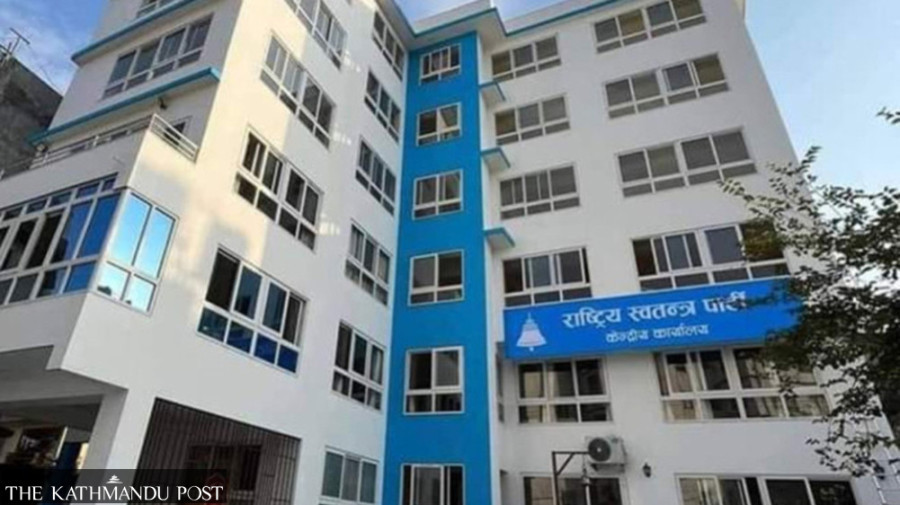Politics
Supreme Court allows contempt of court petition against RSP leaders
Petition claiming new party is trying to obstruct justice to be filed today.
Post Report
The Supreme Court has ordered its administration to accept contempt of court petitions against two dozen Rastriya Swatantra Party (RSP) leaders for their alleged involvement in obstructing judicial proceedings.
Scrapping the decision of joint registrar Achyut Kuikel to reject the petition against the RSP leadership, a single bench of Justice Binod Sharma on Tuesday ordered its administration to register it. Advocate Anupam Bhattarai, on October 30, had reached the court with the petition demanding penalty against top RSP leaders and lawmakers for their alleged contempt of court. Kuikel, however, had refused the petition claiming that it failed to substantiate the defendants’ acts that were contemptuous of court.
Bhattarai last week moved the top court against Kuikel's decision. Justice Sharma then allowed him to register the petition.
“The court has allowed me to proceed with the petition. I will register it tomorrow [Wednesday],” said Bhattarai. His petition claims that the RSP leadership has been trying to defame the judiciary and create a barrier to justice delivery through regular demonstrations and protests against the arrest of Rabi Lamichhane, the party president.
RSP leaders and cadres have been hitting the streets ever since Lamichhane was arrested on October 19 on cooperative fraud and organised crime. Bhattarai has claimed their act is against Article 128(4) of the Constitution of Nepal. In case anyone causes obstruction in the dispensation of justice or disregards any order or judgement handed down by it or any of its subordinate courts, the court may, in accordance with the law, initiate proceedings of contempt, says the constitutional provision.
All the central committee leaders including vice-presidents Dol Prasad Aryal and Swarnim Wagle and most lawmakers including Sumana Shrestha and Sobhita Gautam were defendants in the petition that was rejected. RSP provincial leaders, who are hitting the streets, too, are the defendants. Bhattarai will register the same petition.
Under the leadership of Aryal and Wagle, the RSP carried out a series of protests in Pokhara where police are investigating the charges against the RSP head. The court has extended his remand multiple times, most recently until November 23.
On Tuesday, he was transferred to Bhairahawa from Pokhara after Rupandehi District Court also issued an arrest warrant for his alleged involvement in embezzling millions of rupees from the Butwal-based Supreme Cooperative. The RSP leaders and cadres have staged protests against the arrest in Bhairahawa as he was taken there.
The Rupandehi District Court previously issued arrest warrants for 12 individuals, including Lamichhane and GB Rai, on October 24. The two are accused of misappropriating Rs142.9 million from Supreme Cooperative and diverting it to Gorkha Media Network Pvt Ltd. Investigations indicate Lamichhane had borrowed Rs19.6 million in personal loans from the cooperative.
Further probes revealed that Gorkha Media Network vice-chairman Chhabilal Joshi Banjade took an additional Rs24.5 million loan, which was transferred to Gorkha Media’s Global IME Bank account. Records show Supreme Cooperative’s manager, Sagar KC, authorised a loan voucher for Lamichhane, with Roshani Gurung allegedly moving funds into Gorkha Media’s account. Roshani has since been released on bail, while Cooperative chairman Om Prakash Gurung remains in custody.
An investigation into Supreme Cooperative revealed that Rs780 million of members’ deposits had been diverted to other organisations. Authorities believe over 32 individuals, including former chairman GB Rai, former secretary Dipesh Pun, and KC, were involved in the embezzlement, with 25 still at large.
RSP leaders can face jail terms along with fines if convicted of contempt. The Supreme Court Act, 1991 on Contempt of Supreme Court and subordinate courts states that Supreme Court may slap punishment of up to one year imprisonment or a fine up to Rs10,000 or both to the person convicted.




 10.12°C Kathmandu
10.12°C Kathmandu














